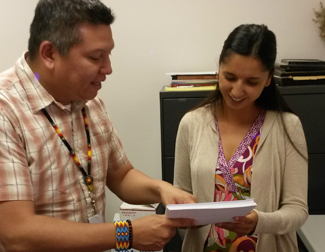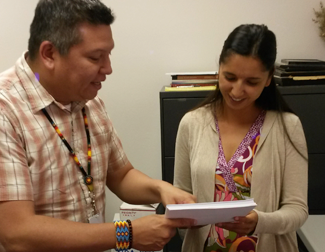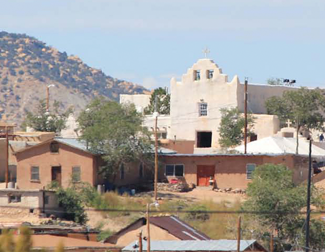Interns receive hands-on experience in tribal and federal Indian law
September 8, 2015 - Jim Williams and Stevie Nichols

Leia Viscarra working with the Director of Operations, Vincent L. Knight (UNM Law ‘04) on drafting code for the Pueblo of Zia.
UNM School of Law’s proximity to a number of surrounding tribes and pueblos lends itself to excellent opportunities for students to get hands-on experience in both tribal law and federal Indian law.
With the help of the Office of Student & Career Services, students work directly with tribal attorneys, in-house counsel, tribal administrators and leaders.
Like many of their classmates working in private firms or for other government organizations, law clerks working for tribal governments draft correspondence, legal memoranda, and pleadings, often directly for the tribal courts and judicial services.
Generally, these students will take on additional projects such as drafting tribal council resolutions and tribal codes, and other issues of tribal governance, economic development, and natural resources.
Below are a few of the students who worked in government positions this summer. Click to read the stories students shared with us.
Read about their experiences here:

Summer experience: Two summer law clerk positions – one at the Pueblo of Zia Governor’s Office, which will continue through the fall semester, and the other at the New Mexico Center on Law and Poverty.
Why two internships? I was very excited to get the opportunity to do two different internships that would give me experience in Indian law and public interest law. I feel that having the opportunity to work in both fields will help me determine what classes and activities will be most beneficial as I progress through law school.
What projects did you work on at the New Mexico Center on Law and Poverty? I have been assigned to the Public Benefits Team, working on flyers that will be made available to the public explaining the different benefit programs. I have also been doing legal research in regard to a case the team is working on with a client whose Supplemental Nutrition Assistance Program benefits were cut.

Leia Viscarra working with the Director of Operations, Vincent L. Knight (UNM Law ‘04) on drafting code for the Pueblo of Zia.
What projects are you working on at the Zia Pueblo? I’ve been working with Tribal Attorney Robert F. Medina (UNM Law ’08) and the Pueblo’s Director of Operations, Vincent L. Knight (UNM Law ‘04) on drafting code as the Pueblo is in the process of developing its own codes. I have also had the opportunity to attend some meetings with people from the Pueblo or people working on the Pueblo’s behalf including the Governor, Lieutenant Governor, the Prosecutor and the Public Defender, the Tribal Judge, as well as officials from the Bureau of Indian Affairs.
What’s your background? I grew up in Albuquerque and graduated from West Mesa High School. I received a B.A. in Criminal Justice from New Mexico State University, a M.A. in Counseling from UNM, and was a public school counselor for over eight years.

Summer experience: Law Clerk position with the Pueblo of Laguna’s Government Affairs Office.
What made you chose this particular position? I am very interested in working with tribes at the ground level in order to understand the needs and issues confronting tribal governments from an inside point of view.
What projects did you work on? I am developing a rangeland code for the Pueblo, which will guide ranching on tribal lands as well as an intergovernmental agreement between the State of New Mexico and the Pueblo of Laguna for assistance with children’s services in accordance with Indian Child Welfare Act and Pueblo law.
Other projects include an analysis of the options for cross-commissioning agreements and mutual aid agreements for law enforcement in New Mexico, drafting speeches for the Governor of the Pueblo, reviewing the vendor permitting process on Pueblo of Laguna lands, creating contracts for hunting leases and permitting on the Pueblo-owned Silver Dollar Ranch on Mount Taylor, analyzing Pueblo law for various divisions of the Pueblo to ensure compliance with the state gross receipts tax, and helping to prepare Laguna tribal officials for the State/Tribal Summit in Santa Fe.
I was also able to file a Motion to Quash a Subpoena, which is still pending a decision from Acoma Tribal Court.

Ward’s summer internship at the Pueblo of Laguna situated at the foothills of the beautiful mountains of Mount Taylor.
What have you learned from this experience? I have learned a great deal about Laguna culture, which has been an amazing and wonderful experience, complementing my exposure to this beautiful geographic area of New Mexico.
I have also learned a lot about the internal issues the Pueblo faces as well as effective solutions for a range of issues.
This will be invaluable experience moving forward. My goal of working in a leadership role for my tribe and as counsel for other tribes has been greatly advanced by this opportunity.
How has your time at UNM School of Law prepared you for this experience? UNM Law is well known for fostering relationships between Native people from all over the United States. I have met some of the best people in the world here who were instrumental in connecting me with this opportunity. Stevie Nichols from the Office of Student & Career Services was also instrumental in the application process.
What’s your background? I am from Durant, OK. I am a member of the Choctaw Nation of Oklahoma and worked for my tribe in various roles for several years before deciding to study federal Indian law at UNM Law. My areas of interest are tribal economic development, protection and management of tribal resources, and the development of modern tribal codes in accordance with traditional law.

What projects did you work on? My work has involved some Indian Law. I wrote a memorandum on whether a New Mexico Pueblo could make a NAGPRA (Native American Graves and Repatriation Act) claim to 10,000 year-old camel bones that were discovered by UNM on an archaeological dig in an old Quarry in Northern New Mexico.
From a policy perspective, I wrote an answer to an Endangered Species Act complaint, an answer to an IBLA (Interior Board of Land Appeals) appeal dealing with NEPA (National Environmental Policy Act) issues, a memorandum outlining New Mexico IPRA (Inspection of Public Records Act) requirements, and two memoranda recommending whether to deny or settle tort claims involving DOI employees.
What have you learned from this experience? I learned a tremendous amount about how the administrative law process works. This summer I had the opportunity to work on Endangered Species Act cases, a NAGPRA issue, and a Special Recreational Permit controversy with the Bureau of Land Management.
In all of the cases and controversies, the underlying issue is usually whether the decision made by the government was arbitrary and capricious under the courts’ interpretation of the Administrative Procedure Act. In other words, although the different sides may be fighting for their individual causes, for the most part, policy cases substantively advance to litigation over whether the agency followed the proper procedures when making final determinations on policy decisions. This is an area of the law that I did not fully appreciate until I had an opportunity to see the litigation up close.
How has your time at UNM School of Law prepared you for this experience? My writing classes (ELA I and ELA II) helped me beyond my expectations. I was very nervous when I was handed my first two assignments. Although I had become very comfortable researching cases and statutes in Professor Stout’s writing classes, researching administrative hearings and records was something completely foreign to me. However, once I realized the searches are not all that different, I was able to utilize the researching skills I had already obtained and continued my development.
How will this help with your career goals? I believe this experience has helped me in two ways.
First, it has broadened my perception of the kind of law that I want to practice. My goals of working within Natural Resource Law were fairly set going into my externship. However, I discovered that I really had no idea what that even meant. I had the opportunity to see the vast array of issues in Natural Resources Law and the many different roles lawyers play in its development and application. In the Solicitor’s office, I had the opportunity to work on the policy development side as well as the advisement side when those policies are challenged in court. I was also able to see how the Department of Justice defended litigation and Attorney Advisers work within the various agencies to make sure the process is not only following the letter of the law but also the agency’s own regulations.
Second, I had an opportunity to work on my writing skills in real world situations. In your first year of law school, many of the legal problems you are given are designed to have a relatively structured case precedence pattern that you can find and develop. Real world cases obviously do not have that luxury. My externship forced me to be more creative in my research and arguments. As an legal extern or law clerk, you are given the opportunity to broaden your creativeness under the guise of attorneys that will work with you to sharpen your legal writing skills. From a career perspective, these are great opportunities to practice and sharpen your skills before heading into fall recruiting. I know that whatever legal position I am able to find next year and beyond, they will have been built upon my experience with the Solicitor’s Office.
What’s your background? My background is in Medical Sales and Management, but my goal has always been to go to Law School. My step-father was an adjunct Water Law professor at UNM and a former DOI Regional Solicitor, so Natural Resources Law/Policy was something I grew up around and was interested in. When he was killed in a bicycle accident in 2010, I was motivated by the legacy he left behind and began working towards applying to law school. With the support of my wife, my mother, and my three boys, I have been able to fulfill my dream.

